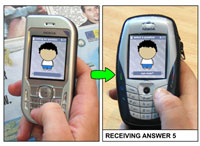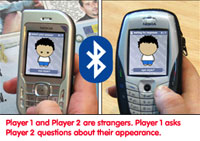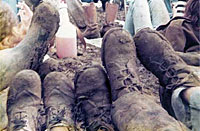 Their glorious football team many not be first at anything much these days, but BT have announced that Cardiff and the surrounding area will lead the UK with the implementation of their 21st Century Network (21CN).
Their glorious football team many not be first at anything much these days, but BT have announced that Cardiff and the surrounding area will lead the UK with the implementation of their 21st Century Network (21CN).
The £10bn investment will roll out the next generation of converged communications, including telephone calls, broadband and Ethernet services delivered through an Internet-based platform.
The investment will end BT’s dependence on telephony through on Ye Olde public switched telephone network (PSTN) and should – in theory – result in cheaper telephone bills for its customers.
What is this 21CN thing, do I hear you ask?
Here’s how BT describe the technology:
“BT’s 21st Century Network (21CN) is a global IP infrastructure, based upon multi-protocol label switching (MPLS), that carries voice, data and Internet services on a single network. The 21CN offers multiple services across a single network, rather than today’s multitude of networks offering specific services.”
“For BT, this will mean fewer network elements overall and require simpler network management. For BT’s customers, the 21CN will deliver more choice, control and accessibility, as well as increased flexibility, reliability and security.”
 BT is expected to begin migrating around 350,000 customer lines in the area during the second half of 2006, with the 21CN programme requiring the replacement of equipment in more than 50 local exchanges along with the implementation of new IT systems to make the technology do its stuff.
BT is expected to begin migrating around 350,000 customer lines in the area during the second half of 2006, with the 21CN programme requiring the replacement of equipment in more than 50 local exchanges along with the implementation of new IT systems to make the technology do its stuff.
Ask BT competitors what 21CN is and you’ll get quite a different answer. Their view is that it is effectively the death of meaningful competition in the UK and that once BT has it in place there will be no incentive to try and unbundle exchanges.
Three cool-sounding “metro nodes” (super telephone exchanges) are to be developed in Cardiff, Swansea and Newport, with 10 new transmission sites also being developed across the region. These will be assessed for power supply, space and logistics planning before the ‘on’ switch is pressed.
First Minister Rhodri Morgan purred, “It’s incredibly exciting for us that Wales has been selected to provide the test bed for BT’s new 21st Century Network This investment by BT clearly signifies that Cardiff and central South Wales is one of Europe’s most dynamic and progressive regions. The end result will transform our personal and business lives, and help attract high-tech industry and services to Wales.”
Matt Bross, BT group’s chief technology officer, said, “This roll-out will be the first time anywhere in the world that customers will have communications services provided over such a radical next generation network.”
“The operational experience that we gain in Cardiff and the surrounding area will enable us to move full steam ahead and deliver 21CN to everyone in the UK – migrating a total of 30 million lines – in just four years.”
“It’s an enormous technical and operational challenge, but will enable customers to benefit from compelling new services.”
How the installation and implementation of the service – and the customer feedback – works out will help BT finalise plans to roll out 21CN to customers across the UK by the end of the decade.
BT 21st Century Network
 US police have arrested a Florida man for gaining illegal access on a domestic wireless Internet network.
US police have arrested a Florida man for gaining illegal access on a domestic wireless Internet network. There’s not much harm in that, but the newspaper report points out the darker side of Wi-Fi pilfering, with criminals using the unsecured networks to traffic in child pornography, steal credit card information and even send death threats.
There’s not much harm in that, but the newspaper report points out the darker side of Wi-Fi pilfering, with criminals using the unsecured networks to traffic in child pornography, steal credit card information and even send death threats. Dysfunctional drunks, lurking loners and nervous nerds need no longer feel alone thanks to a new mobile phone guessing game called YOU-WHO.
Dysfunctional drunks, lurking loners and nervous nerds need no longer feel alone thanks to a new mobile phone guessing game called YOU-WHO. Once a set number of clues have been given, the players’ phones ‘call’ to each other with a distinctive sound, thus revealing both players’ locations and identities, quickly followed by screams of “Aaaargh!” Get away from me you weird freakshow nerd!”
Once a set number of clues have been given, the players’ phones ‘call’ to each other with a distinctive sound, thus revealing both players’ locations and identities, quickly followed by screams of “Aaaargh!” Get away from me you weird freakshow nerd!” You-WHO is offered as a free 28 day time-limited demo. The cheery young developers at AgeO+ hope to have a full commercial release soon.
You-WHO is offered as a free 28 day time-limited demo. The cheery young developers at AgeO+ hope to have a full commercial release soon. It can be a confusing life for protesters keen to voice their opinions at the G8 meeting in Gleneagles.
It can be a confusing life for protesters keen to voice their opinions at the G8 meeting in Gleneagles.
 All those signing up will have their names added to the online petition, the Live 8 list, which is being sent directly to the G8 leaders.
All those signing up will have their names added to the online petition, the Live 8 list, which is being sent directly to the G8 leaders. The European Parliament has voted overwhelming against a controversial bill that might have led to software being patented.
The European Parliament has voted overwhelming against a controversial bill that might have led to software being patented. The bill was supposed to get rid of individual EU nations’ patent dispute systems and replace it with a common EU procedure. Instead, the old system of patents being handled by national patent offices will continue, without any judiciary control by the European Court of Justice.
The bill was supposed to get rid of individual EU nations’ patent dispute systems and replace it with a common EU procedure. Instead, the old system of patents being handled by national patent offices will continue, without any judiciary control by the European Court of Justice. It used to be that attending a festival was more akin to a long trek in a distant country, with festival-goers vanishing for days on end, uncontactable by the outside world.
It used to be that attending a festival was more akin to a long trek in a distant country, with festival-goers vanishing for days on end, uncontactable by the outside world. Like Glastonbury, Live 8 and several other big music festivals, band’s performances at the Reading Festival will be available to view over the Web via a streaming Webcast, with official sponsors Tiscali providing the coverage.
Like Glastonbury, Live 8 and several other big music festivals, band’s performances at the Reading Festival will be available to view over the Web via a streaming Webcast, with official sponsors Tiscali providing the coverage. China has opened its first officially licensed clinic for Internet addiction as State media reports growing cases of obsessed Internet gamers whose addiction has caused them to quit school, commit suicide or
China has opened its first officially licensed clinic for Internet addiction as State media reports growing cases of obsessed Internet gamers whose addiction has caused them to quit school, commit suicide or  Hot on the heels of the hugely successful Live8 concert in London, Apple’s iTunes Music Store has made the opening performance of The Beatles’s “Sergeant Pepper” (sung by McCartney with U2) available for purchase through its store.
Hot on the heels of the hugely successful Live8 concert in London, Apple’s iTunes Music Store has made the opening performance of The Beatles’s “Sergeant Pepper” (sung by McCartney with U2) available for purchase through its store. Distribution is to be exclusively digital, so there will be no physical product. All profits are to be donated to Live 8, “and the fight for the future of Africa”, according to the iTunes Website.
Distribution is to be exclusively digital, so there will be no physical product. All profits are to be donated to Live 8, “and the fight for the future of Africa”, according to the iTunes Website. Their glorious football team many not be first at anything much these days, but BT have announced that Cardiff and the surrounding area will lead the UK with the implementation of their 21st Century Network (21CN).
Their glorious football team many not be first at anything much these days, but BT have announced that Cardiff and the surrounding area will lead the UK with the implementation of their 21st Century Network (21CN). BT is expected to begin migrating around 350,000 customer lines in the area during the second half of 2006, with the 21CN programme requiring the replacement of equipment in more than 50 local exchanges along with the implementation of new IT systems to make the technology do its stuff.
BT is expected to begin migrating around 350,000 customer lines in the area during the second half of 2006, with the 21CN programme requiring the replacement of equipment in more than 50 local exchanges along with the implementation of new IT systems to make the technology do its stuff. In a pretty gung-ho move that shows a lot of seriousness, the US Department of Justice (DoJ) have announced the results of Operation Site Down. More than 20 raids occurred in Australia, Belgium, Canada, Denmark, France, Germany, Israel, the Netherlands, Portugal and the UK, as well as 70 in the USA.
In a pretty gung-ho move that shows a lot of seriousness, the US Department of Justice (DoJ) have announced the results of Operation Site Down. More than 20 raids occurred in Australia, Belgium, Canada, Denmark, France, Germany, Israel, the Netherlands, Portugal and the UK, as well as 70 in the USA. Cable company Telewest Broadband is making Teleport, its TV-on-demand service, available to over 26,000 customers in Cheltenham and Gloucester today.
Cable company Telewest Broadband is making Teleport, its TV-on-demand service, available to over 26,000 customers in Cheltenham and Gloucester today. Teleport Movies offers around 200 current and library films from FilmFlex, with rental charges costing between £2.00 (~$3.59, ~€3) and £3.50 (~$6.28, ~€5.20) for a 24-hour rental period.
Teleport Movies offers around 200 current and library films from FilmFlex, with rental charges costing between £2.00 (~$3.59, ~€3) and £3.50 (~$6.28, ~€5.20) for a 24-hour rental period.